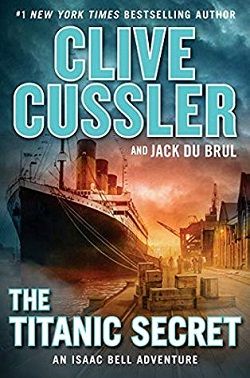The Titanic Secret, the eleventh installment in Clive Cussler's Isaac Bell series, is a thrilling blend of historical intrigue and modern adventure that showcases the author's signature style of weaving fact with fiction. In this novel, Cussler takes readers on a dual-timeline journey, connecting the past and present through the enigmatic figure of Isaac Bell and the contemporary hero, Dirk Pitt. This narrative structure not only enriches the storytelling but also allows for a deeper exploration of themes such as legacy, the pursuit of truth, and the moral complexities of human ambition.
The story begins in the present day, where Dirk Pitt, the director of the National Underwater and Marine Agency (NUMA), finds himself in a precarious situation involving a daring rescue from an antiquated submersible. This gripping opening sets the tone for the adventure that follows, as Pitt uncovers a document left behind by Isaac Bell, a legendary detective from a century earlier. This document serves as a catalyst for the unfolding mystery, linking the two protagonists across time and highlighting the enduring impact of Bell's work.
In 1911, we are introduced to Isaac Bell, a character who embodies the qualities of a classic detective—intelligent, resourceful, and unyielding in his quest for justice. Bell is called to investigate a tragic incident at the Little Angel Mine in Colorado, where nine miners have mysteriously perished. As he delves deeper into the investigation, Bell discovers that the tragedy is not an isolated event but part of a larger conspiracy involving a rare and powerful element known as byzanium. This element, with its extraordinary properties, becomes the focal point of Bell's investigation and a symbol of the lengths to which individuals will go to obtain power and wealth.
The theme of greed is prevalent throughout the novel, as Cussler explores how the desire for wealth can lead to moral corruption and devastating consequences. The characters who seek to control byzanium are portrayed as ruthless and willing to sacrifice lives for their ambitions. This theme resonates with contemporary issues, making the story feel relevant and thought-provoking. Cussler's ability to draw parallels between historical events and modern-day dilemmas adds depth to the narrative, inviting readers to reflect on the implications of their own choices.
Character development is another strong suit of The Titanic Secret. Isaac Bell is portrayed as a man of principle, driven by a sense of duty and justice. His determination to uncover the truth, even in the face of danger, makes him a compelling protagonist. Cussler skillfully contrasts Bell's steadfastness with the morally ambiguous characters who surround him, creating a rich tapestry of motivations and conflicts. The interactions between Bell and these characters are fraught with tension, adding to the suspense of the narrative.
Dirk Pitt, while a contemporary character, shares many of Bell's qualities. His resourcefulness and bravery are evident as he navigates the challenges presented by the document he discovers. The connection between Pitt and Bell serves to highlight the idea that the quest for truth and justice transcends time. Cussler effectively uses this duality to explore how the legacies of individuals can influence future generations, reinforcing the notion that history is not merely a series of events but a continuum of human experience.
The pacing of the novel is brisk, with Cussler expertly balancing action sequences with moments of introspection and revelation. The transitions between the two timelines are seamless, allowing readers to engage fully with both narratives. Cussler's descriptive prose brings the settings to life, whether it be the bustling streets of early 20th-century Colorado or the depths of the ocean in modern-day New York. This vivid imagery enhances the reading experience, immersing readers in the world he has created.
Moreover, the incorporation of real historical events and figures adds an element of authenticity to the story. Cussler's meticulous research is evident, as he weaves factual elements into the fictional narrative. This blending of history and fiction not only entertains but also educates readers about the complexities of the past, particularly regarding maritime disasters and the mining industry. The exploration of the Titanic disaster, although not the central focus, serves as a poignant reminder of the fragility of human endeavors and the unforeseen consequences of ambition.
In comparison to other works by Cussler and similar authors, The Titanic Secret stands out for its intricate plotting and character depth. While many adventure novels prioritize action over substance, Cussler manages to strike a balance, ensuring that the characters' motivations and the ethical dilemmas they face are as engaging as the thrilling escapades. Readers who enjoy the works of authors like James Rollins or Steve Berry will find much to appreciate in Cussler's storytelling style, which combines adventure with intellectual curiosity.
Overall, The Titanic Secret is a captivating read that will appeal to fans of historical fiction, adventure, and mystery. Clive Cussler has crafted a narrative that not only entertains but also prompts reflection on the nature of ambition, the pursuit of truth, and the legacies we leave behind. With its well-developed characters, intricate plot, and rich historical context, this novel is a testament to Cussler's prowess as a storyteller and his ability to engage readers across generations.





![A Killer Paradox [Official]](/upload/pic/manga/a-killer-paradox--official-.jpg)


















Reviews 0
Post a Reviews: